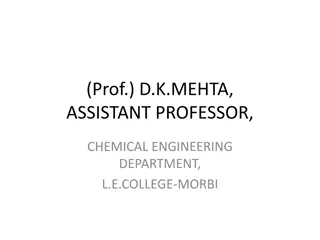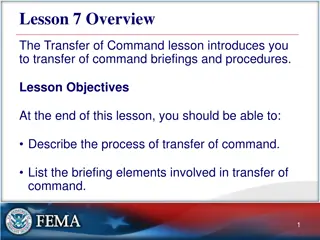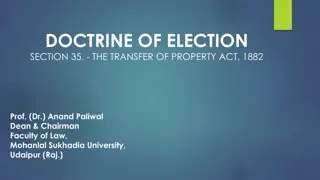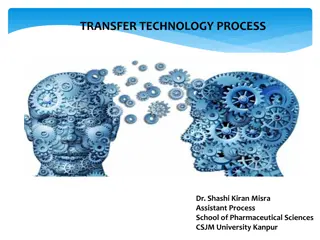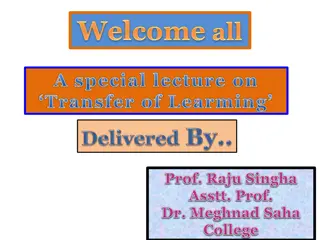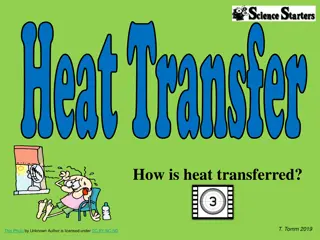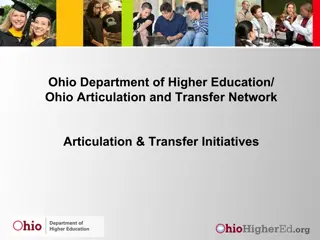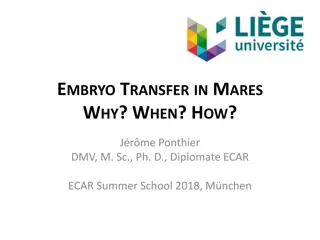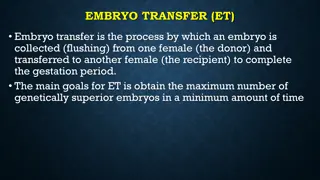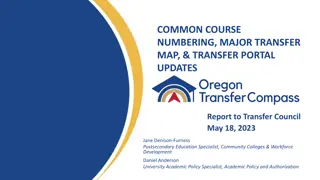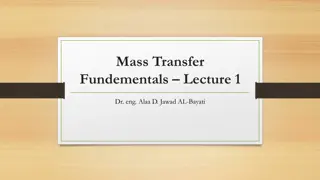Demystifying the College Transfer Process
Understanding the transfer process from an Associate's Degree to a Bachelor's Degree involves debunking common myths and requirements. Learn about different types of degrees, transfer prerequisites, and general education curricula such as IGETC and CSU breadth sequence. Discover the differences between CSU and IGETC GE requirements, and prepare effectively for a successful transfer to your desired institution.
Download Presentation

Please find below an Image/Link to download the presentation.
The content on the website is provided AS IS for your information and personal use only. It may not be sold, licensed, or shared on other websites without obtaining consent from the author.If you encounter any issues during the download, it is possible that the publisher has removed the file from their server.
You are allowed to download the files provided on this website for personal or commercial use, subject to the condition that they are used lawfully. All files are the property of their respective owners.
The content on the website is provided AS IS for your information and personal use only. It may not be sold, licensed, or shared on other websites without obtaining consent from the author.
E N D
Presentation Transcript
HOW TO TRANSFER 101 Demystifying the Transfer Process
TYPES OF DEGREES Associate s Degree: (What you can get at College of Marin) 60 Units Two Years of full-time study Combination of General Education Courses & Major Courses Bachelor s Degree: (What you can get after you transfer) 120 Units Four years of full-time study Two years of General Education and Major Prep and two years of Major Courses. Master s Degree or Professional Degree Two to Three Years of full-time post-bachelor s degree study (generally.) Doctoral Degree Three years + of post-bachelor s degree study (generally.)
TRUE OR FALSE. I need an Associate s Degree before I can get my Bachelor s Degree. FALSE I can only pursue an Associate s Degree OR a Bachelor s Degree/transfer preparation not both. FALSE Courses can fulfill a major requirement OR a general education requirement not both. FALSE Getting an AA/AS will be advantageous to me when applying to transfer institutions. FALSE All of the course units I take count towards my degree. FALSE
SOUNDS GOOD. SO HOW DO I PREPARE TO TRANSFER? Transfer Requirement 1: 60 transferable units Check in schedule of classes to see if the units transfer! Example: Course: ANTH 101 - Introduction to Physical/Biological Anthropology Catalog Desc: (No prerequisite.) This course examines evolutionary theory as a unifying theory that encompasses human variation and human evolution, as well as genetics and the human genome. Topics include primates, including behavior, anatomy, features of the skeletal system, and the current threat of habitat loss; forensic analysis; archaeological theory and methodology; scientific method; and an overview of the most significant fossil sites that relate to human evolution. The department has an extensive collection of fossil casts that allows students the opportunity to actually see them in person rather than relying solely upon photographs or descriptions. Some instructors may require field trips to local zoos, museums or lectures. (CSU/UC) AA/AS Area A, CSU Area B-2, IGETC Area 5B
Transfer Requirement 2: GENERAL EDUCATION (GE) CURRICULA IGETC: Intersegmental General Education Transfer Curriculum. Great if you re applying to both University of California and California State University FOR MOST MAJORS. Engineering, business, some science majors are sometimes better off NOT following IGETC. CSU breadth sequence: If you re planning only to apply to CSUs. AA/AS requirements for College of Marin: Can be applied both towards COM and CSU or IGETC/transfer requirements IF YOU CHOOSE YOUR COURSES CAREFULLY! MAKE AN APPOINTMENT WITH A COUNSELOR TO DETERMINE WHICH IS RIGHT FOR YOU!
What are the 3 differences between the CSU and IGETC general education curriculum? - CSU: Need oral communication class - UCs: Need 2 years of high school language or a semester of language at COM. - CSU: Need 2 U.S. History Courses to graduate from a CSU (though they do not need to be taken before you transfer).
Transfer Requirement 3: MAJOR PREPARATION There are THREE places to check for this: All major courses for AA/AS are listed in the College of Marin catalog (available online.) Check DegreeWorks, your Degree Audit system. A Counselor can check this with you! If you are transferring to a CSU or UC, you must check ASSIST.org for requirements! Assist helps you find California public institutions that offer your major, among other things!
DegreeWorks Log onto your MyCOM portal On the left hand menu, click DegreeWorks Notice which classes you ve taken and which still need to be fulfilled Make an appointment with a counselor if you have any questions!
Assist.org If you are transferring to CSU or UC, you must check ASSIST.org for requirements! Assist helps you find California public institutions that offer your major, among other things! Log into Assist and look up your major and two universities you are thinking of transferring to What classes are required? Recommended? Do the two universities have different requirements?
COMMON MISHAPS Taking far too many courses in one category of general education. EXCEPTION: If the courses are for major preparation! Enrolling in a full-time load of courses while working 25+ hours a week Not checking if a course is transferable to both UC and CSU Enrolling in too many key transfer courses toward the end of your time at COM. NOT MEETING WITH A COUNSELOR TO CREATE AN EDUCATION PLAN!!!! Following old catalog requirements. IF YOU TAKE MORE THAN ONE SEQUENTIAL SEMESTER OFF FROM COM, YOU LOSE CATALOG RIGHTS
HOW DO I GUARANTEE ADMISSION? CSU: AA/S-T (ADT) Benefits: Local admission priority GPA bump Deferral of impaction for some campuses Redirection 60 units after transfer Requirements: 60 CSU transferable units, a 2.0 cumulative CSU transferable GPA (2.4 for non-resident students or 2.8 for international students), and the golden four (most CSU campuses require a letter grade of C or better in each golden four course for admission: ENGL 150&151, MATH, ORAL COMM) Students must complete a full CSU GE or IGETC pattern Students must complete the major coursework specified for the AA T/AS T degree
HOW DO I GUARANTEE ADMISSION? UC: TAG Requirements: 3 campuses do not participate (UCLA, UCB, UCSD) 60 transferable credits (30 completed by the year you apply) 7 course pattern (2 English, 1 math, 4 courses from at least 2 of the following: arts/humanities, behavioral/social sciences, biological/physical sciences) Refer to the TAG matrix for specifics on GPA, timeline of courses, and more by campus and major Make an appointment with a counselor to learn what YOU need to do to TAG and for a personalized TAG plan (This happens quickly in the beginning of the school year, so start to think about it in the Spring or Summer before you plan to TAG.)
PRIVATE AND OUT-OF-STATE TRANSFER No articulation agreements: generally less restrictive admissions requirements BUT transfer of all credit is not guaranteed. Often you can transfer with only 24-30 units, and without any specific major prep or GE pattern Each college/university will have it s own requirements the best resource for admission information is each schools website Financial aid is still readily available! Make an appointment with a counselor or the Transfer Center to learn more
HOW DO I GET MORE INFORMATION ABOUT TRANSFER? Join the Transfer Center Email List! Get information about: University rep visits (from the bay area, state, country, and the world!) Workshops like this one Scholarship opportunities Amazing internships and opportunities that will advance your chances/experience Events and campus visits (including one to SoCal all expenses paid!) Go to the COM Website Transfer and Career front page to join! Students Fill out the form on the
HOW DO I GET PERSONAL HELP WITH MY TRANSFER PLAN? MAKE AN APPOINTMENT WITH A COUNSELOR! Log onto your MyCOM portal Under Student Services and Resources click Counseling Click Schedule a Counseling Appointment at KTD/IVC
Which one of these Universities would accept a transfer student with fewer than 60 transferable units? A)Sonoma State University B)Dominican University C)UC Berkeley D)None of the above
Answer: Dominican University. Many private colleges accept students with fewer than 60 units.
Name one form of funding available to you as a college student that you do NOT have to pay back...
Answer: Scholarships, federal aid, grants, anything but LOANS!
Once you transfer, how many years does it typically take to finish your bachelor s degree?
Answer: Typically takes two years, and many schools REQUIRE completion within two years after transfer.
True or False: I can change my major AFTER I transfer...
Answer: Yes! After one semester or one quarter at a UC or CSU (and most private colleges) you are eligible to apply for a change of major. It is very hard, however, to change majors into an impacted major (engineering, business, economics, etc.)
Answer: Yes! This is often called a double major or simultaneous degree
What is the lowest transferable GPA you can have and still meet minimum admissions requirements for California State Universities? A) 1.8 B) 2.5 C) 2.0 D) 3.2
Answer: 2.0, or C- average. Below a 2.0 students are considered not in good academic standing.
Youve decided you want to become a lawyer after graduating with your bachelor s degree. How many years does it take to complete a law degree (Juris Doctor?) A) Five years B) Three years C) Neither of the above
Answer: Three years of study.
You want to transfer to UC Davis and you notice that they offer two different degrees in psychology: An A.B. and a B.S. what s the difference? A) The B.S. degree is harder and therefore more desirable. B) The A.B. degree is not a four-year degree C) The difference is in the content of the coursework: B.S. has more science content.
Answer: The content of the major. B.S. or Bachelor s of Science degrees include more science-based curriculum (biology, chemistry, physics, etc )
The following is an example of a non-transferable course: A) Business 101 B) Counseling 130 C) English 098
Answer: English 098. With the exception of English 120, (which only CSU accepts,) CSU and UCs do not accept developmental English and Math courses as transferable.
The A.A.-T and A.S.-T (Associate Transfer) degrees may be most helpful when applying to which college system:
Answer: California State University. These degrees guarantee admission at A CSU CAMPUS, though not necessarily to a specific major, and confer a small GPA bump (around .1 higher)








